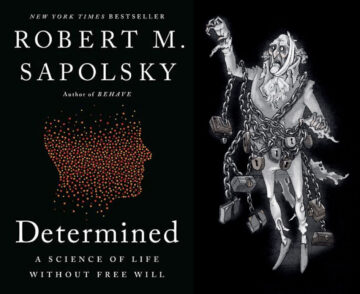by Jerry Cayford

Robert Sapolsky claims there is no free will. Jacob Marley begs to differ. Let us consider their dispute. Sapolsky presents his case in Determined: A Science of Life Without Free Will: everything has a cause, so all our actions are produced by the long causal chain of prior events—never freely willed—and no action warrants moral praise or blame. He supports this position with a great deal of science that was not available back when Marley was alive, though “alive” seems an awkward way to put it, since Marley is a fictional ghost, possibly even a dreamed fictional ghost (depending on your interpretation of A Christmas Carol), dreamed by fictional Ebenezer Scrooge. Marley’s standing to bring objections against Sapolsky seems pretty tenuous.
Nevertheless, Marley forthrightly rejects Sapolsky’s thesis: “‘I wear the chain I forged in life,’ replied the Ghost. ‘I made it link by link, and yard by yard; I girded it on of my own free will, and of my own free will I wore it.’” That there is a real dispute here is proven by Scrooge presenting a very Sapolskian argument against Marley’s right to bring a case at all: “You may be an undigested bit of beef, a blot of mustard, a crumb of cheese, a fragment of an underdone potato.” That is, only a chain of physico-chemical causes makes me, Scrooge, see you at all, let alone give any credence to your arguments about morality. If this rebuttal seems sophisticated for a fictional Victorian businessman, it at least reminds us that Sapolsky’s philosophical position is quite old and well known.
Unlike Scrooge, Sapolsky does not inhabit the same fictional realm as Marley’s ghost. He cannot argue that Marley’s sins were caused by prior conditions and events, because Marley’s sins and choices don’t really exist, not in the causal universe in which Sapolsky makes his argument. As he so emphatically puts it: “But—and this is the incredibly important point—put all the scientific results together, from all the relevant scientific disciplines, and there’s no room for free will.…Crucially, all these disciplines collectively negate free will because they are all interlinked, constituting the same ultimate body of knowledge” (8-9). Marley’s ghost, though, is not of that body—an “incredibly important point” indeed—and that’s precisely the reason to choose him as our spokes-“person.” Read more »
